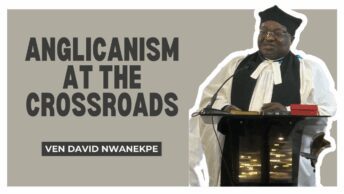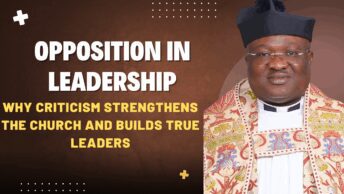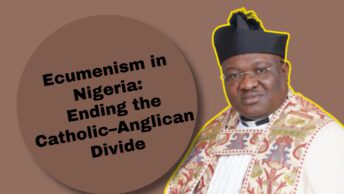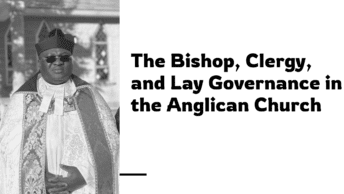The Anglican Communion today faces diverse challenges across its provinces. In Africa, polygamy remains a cultural and pastoral issue. In the West, the debates center on homosexuality and lesbianism. Meanwhile, questions of women in leadership continue to stir conversation in Nigeria and a few other provinces, even though much of the Anglican world has embraced the ordination of women to the priesthood and episcopacy.
As for me, there is nothing wrong with a woman assuming leadership in the Church. Across the Communion, women now serve faithfully as priests, bishops, and even archbishops. The Church of England consecrated its first female bishop in 2015, and other provinces such as the Episcopal Church (USA), the Anglican Church of Canada, and the Church of Australia have long embraced women in ordained ministry. It is only in Nigeria and a few other provinces that this development is still resisted. Biblically and theologically, I am not against women in leadership or ordination. My personal opinions do not override the wider discernment of the Church, but I affirm that leadership should always be based on fidelity to God’s Word, not gender alone.
The Question of Liberalism
My concern lies not with gender but with theology—particularly the growing influence of liberalism in some provinces of the Communion. Leadership, whether by men or women, must remain accountable to the Scriptures and historic Anglican formularies. The danger arises when leaders, under the banner of liberalism, promote same-sex unions or normalize homosexual practice. Leadership divorced from biblical authority is no longer true Christian leadership.
The Biblical Witness on Polygamy and Homosexuality
1. Polygamy in Africa
Polygamy remains widespread in Africa, but the Bible makes clear that God’s design for marriage is monogamous. From the beginning, the Creator made them “male and female” and declared, “a man shall leave his father and mother and be joined to his wife, and the two shall become one flesh” (Genesis 2:24; cf. Matthew 19:4–6).
Although Old Testament patriarchs practiced polygamy (e.g., Jacob, David, Solomon), the results were often disastrous, producing jealousy, rivalry, and brokenness (see 1 Samuel 1:6–7). The New Testament affirms monogamy, requiring bishops and elders to be “the husband of one wife” (1 Timothy 3:2; Titus 1:6). Marriage is elevated as a sacramental sign of the union between Christ and the Church (Ephesians 5:31–32), something that polygamy cannot reflect.
2. Homosexuality in the West
In Western contexts, the greater challenge is homosexuality and lesbianism. Scripture consistently condemns same-sex sexual acts:
- “You shall not lie with a male as with a woman; it is an abomination” (Leviticus 18:22).
- Paul speaks of men and women exchanging “natural relations” for “unnatural” ones, describing it as dishonorable and contrary to God’s design (Romans 1:26–27).
- Likewise, 1 Corinthians 6:9–10 lists homosexual practice among sins that exclude from the kingdom of God—yet immediately adds, “such were some of you, but you were washed, sanctified, and justified in the name of the Lord Jesus Christ” (v. 11).
Thus, while the act must be condemned, the person must be loved.
Anglican Communion Statements
The Lambeth Conference Resolution I.10 (1998) affirmed that:
- Marriage is between a man and a woman.
- Homosexual practice is incompatible with Scripture.
- The Church must minister pastorally and sensitively to all, regardless of sexual orientation, while rejecting “irrational fear” or hatred toward homosexual persons.¹
The GAFCON Jerusalem Declaration (2008) similarly reaffirmed marriage as the lifelong union of one man and one woman and rejected liberal innovations on sexuality as contrary to biblical teaching.²
The Church of Nigeria has consistently aligned with these positions, rejecting attempts to normalize same-sex unions while affirming the biblical call to holiness in every area of life.
Condemning the Sin, Loving the Sinner
It is vital to distinguish between condemning the sin and condemning the sinner. I have personally met and worked with people who identify as gay. Many of them show love, care, and humanity. Though I cannot accept their sexual philosophy, I will not demean or fight them. They remain human beings created in God’s image.
This is how Jesus dealt with sinners: He never condoned sin, but He always extended love. To the woman caught in adultery, He said: “Neither do I condemn you; go, and sin no more” (John 8:11). The Church must learn to do the same—rejecting the act but loving the person.
Other Sins in the Church
If we must be consistent, then our moral outrage should not stop at homosexuality. What about:
- Priests who commit adultery or sleep with other people’s spouses?
- Leaders who sell church land for selfish gain?
- Clergy who embezzle funds, exploit their members, or practice nepotism?
- Ministers who abuse authority, bully subordinates, or silence the truth?
- Hypocrisy, drunkenness, arrogance, and corruption within the Church?
If we hate sin, then let us hate all sin. Otherwise, our condemnation of homosexuality alone becomes hypocrisy.
Conclusion: Truth and Grace Together
Therefore, my position is clear:
- On women: Leadership by women is not inherently unbiblical, provided it upholds the truth of Scripture.
- On polygamy and homosexuality: Both are contrary to God’s design and must be rejected.
- On individuals: Those caught in these sins must not be hated but loved, counseled, and restored.
- On consistency: The Church must condemn all sin equally, not selectively.
The gospel of Jesus Christ is the power of God to transform lives—whether the polygamist in Africa, the homosexual in the West, or the corrupt leader in our pulpits. Our mission is to proclaim that transforming gospel with both truth and grace. As Augustine taught: *“With love for mankind and hatred of sins, we walk the narrow way.”*³
References
- Lambeth Conference 1998, Resolution I.10, Human Sexuality.
- GAFCON, The Jerusalem Declaration, 2008.
- Augustine of Hippo, Letter 211, “Cum dilectione hominum et odio vitiorum” (“With love for mankind and hatred of sins”).
- The Holy Bible: Genesis 2:24; Leviticus 18:22; Matthew 19:4–6; Romans 1:26–27; 1 Corinthians 6:9–11; Ephesians 5:31–32; 1 Timothy 3:2; Titus 1:6; John 8:11.








